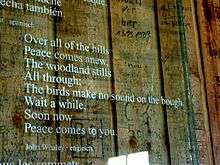Wanderer's Nightsong

"Wanderer's Nightsong" (German: Wandrers Nachtlied) is the title of two poems by the German poet Johann Wolfgang von Goethe. Written in 1776 ("Der du von dem Himmel bist") and in 1780 ("Über allen Gipfeln"), they are among Goethe's most famous works. Both were first edited together in his 1815 Works Vol. I with the headings "Wandrers Nachtlied" and "Ein gleiches" ("Another one"). Both works were set to music as lieder by Franz Schubert as D 224 and D 768.
Wanderer's Nightsong I

The manuscript of "Wanderer's Nightsong" ("Der du von dem Himmel bist") was among Goethe's letters to his friend Charlotte von Stein and bears the signature "At the slope of Ettersberg, on 12 Feb. 76"; supposedly it was written under the tree later called the Goethe Oak.[1] One translation is by Henry Wadsworth Longfellow:
Der du von dem Himmel bist, |
Thou that from the heavens art, |
The tired wanderer probably impersonates Goethe himself, whose fame and fortune increasingly affected his creativity. The first line is a reference to the song of Nicolaus Zinzendorf "Der Du in dem himmel bist" [sic] (1742) about the Lord's Prayer "Our Father who art in heaven". The German philologist Reinhard Breymayer has demonstrated this fact for the first time in 1998.[2]
Franz Schubert set the poem to music in 1815.
Wanderer's Nightsong II

"Wanderer's Nightsong II ("Über allen Gipfeln") is often considered the perhaps most perfect lyric in the German language.[3] Goethe probably wrote it on the evening of September 6, 1780, onto the wall of a wooden gamekeeper lodge on top of the Kickelhahn mountain near Ilmenau where he, according to a letter to Charlotte von Stein, spent the night.[4]

Über allen Gipfeln |
Above all summits |
Over all of the hills |
_b_657.jpg)
Goethes friend Karl Ludwig von Knebel mentioned the writing in his diary, it is also documented in transcriptions by Johann Gottfried Herder and Luise von Göchhausen. However, the handwriting is not preserved. It was first published—without authorization—by August Adolph von Hennings in 1800 and again by August von Kotzebue in 1803. An English version appeared in the Monthly Magazine in February 1801.[5] The second poem was also set by Franz Schubert, in 1823. As Goethe wrote to Carl Friedrich Zelter, he revisited the cabin more than 50 years later on August 27, 1831, about six months before his death. The poet recognised his handwriting and reportedly broke out in tears.
The accomplished poem unites landscape, creation and beings in evening silence, while man may still be restless but will expect sleep, death and eternal peace. In one small piece of poetry, Goethe wanders the whole cosmos.
In popular culture
The mountain hut had already become famous as "Goethe's Cabin" by the late 1830s. Burnt down in 1870, it was rebuilt four years later. Parodies of "Ein gleiches" were written by Christian Morgenstern, Joachim Ringelnatz, Karl Kraus, and Bertolt Brecht. A computational linguistics processing of the poem was the topic of a 1968 radio drama written by Georges Perec. It is also cited in Daniel Kehlmann's 2005 novel Measuring the World, in Milan Kundera's novel Immortality, and in Walter Moers' novel The City of Dreaming Books.
John Ottman's musical score for Bryan Singer's 2008 film Valkyrie contains a requiem-like piece for soprano and chorus in the exit music with "Ein gleiches" as lyrics. In the film's context, the poem serves as a lament on the miscarried assassination on Adolf Hitler on July 20th, 1944, mourns the proximate death of most of the assassins, and with the last two lines forecasts the demise of those whom they failed to kill.[6]
References
- ↑ Gorra, Michael (2009). The Bells in Their Silence: Travels through Germany. Princeton UP. p. 16. ISBN 9781400826018.
- ↑ Cf. Reinhard Breymayer: Friedrich Christoph Steinhofer. Ein pietistischer Theologe zwischen Oetinger, Zinzendorf und Goethe. [...] Noûs-Verlag Thomas Leon Heck, Dußlingen 2012, pp. 24–27, here p. 26: Evangelisches Gesang-Buch [...] Der Gemeine in Ebersdorf [...] gewidmet. [Ed. by Friedrich Christoph Steinhofer.] 2. and augmented edition, Ebersdorf (Vogtland), 1745, p. 742. – Concerning the library of Goethe's father cf. Franz Götting: Die Bibliothek von Goethes Vater. In: Nassauische Annalen 64 (1953), pp. 23–69, here p. 38 (falsely "1743" for "1745" of the second edition). The 1745 edition is Goethe's source.
- ↑ cf. Alan P. Cottrell: Goethe's view of evil and the search for a new image of man in our time (1982) p. 35
- ↑ Erich Trunz, in: Goethes Werke (Hamburger Ausgabe) vol. 1, 16th ed. 1996, p. 555
- ↑ p. 42 books.google
- ↑ Interview with film composer John Ottmann about his score for Valkyrie
External links
 Media related to Wandrers Nachtlied at Wikimedia Commons
Media related to Wandrers Nachtlied at Wikimedia Commons- "Wanderer's Nightsong"